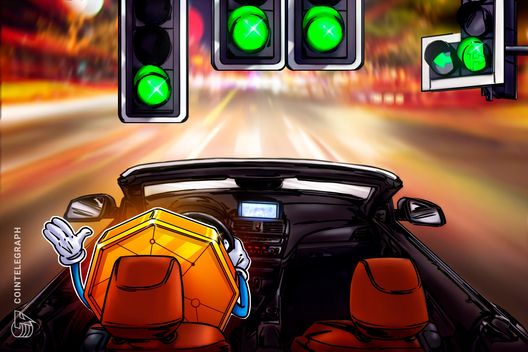
Opinion by: Evan Kuhn, president of DeLorean Labs
When automobile producers develop a brand new mannequin, their fragmented logistics and gross sales cycle imply that even when a buyer places down a deposit, they haven’t any possible or dependable manner of projecting supply for that automobile.
Keen automobile patrons can wait months and even years after paying their deposit, with out understanding the place they sit within the queue for supply. That is why new fashions are priced over the sticker value when vehicles first enter the market.
There was no industry-wide resolution — however tokenized reservations will open up a multitrillion-dollar market.
The damaged logic of contemporary automobile reservations
Reserving a automobile mannequin at present is extremely inefficient. Automotive patrons pay large markups when new fashions are rolled off the lot as a result of there isn’t a foresight into manufacturing schedules.
The choices are, if you would like the brand new automobile now, you must pay a substantial premium over the sticker value, and for those who’re going to pay the common sticker value, you haven’t any say or thought as to when you’re going to get supply of your automobile. So, how huge is that this drawback?
A current APAC hospitality examine confirmed cancellations by way of Reserving.com account for 40% of income. As compared, Expedia sees 24%, suggesting tens of billions at stake globally, whereas ticket resale platforms extract 30% markups, leaving each artists and followers worse off.
Car waitlists stay much more opaque. Sellers have bilked patrons with $30,000-$70 ,000 markups on Ford F‑150 Lightning orders, demonstrating a profitable secondary market created solely by info asymmetry, even with no formalized “black market.” Even manufacturing suffers, with 15%-30% of capability sitting idle, as per a McKinsey report, as a result of small corporations lack entry to tradable reservation methods.
Sensible contracts on the blockchain elegantly resolve issues related to info asymmetry. Tokenized flat reservations, for instance, can escrow deposits onchain, permitting patrons to commerce their positions freely, whereas builders preserve regular gross sales momentum.
The auto {industry}’s $50-billion tokenization alternative
The automotive sector presents a compelling case for reservation tokenization, the place phantom waitlists have lengthy enabled abusive markups.
Tesla’s Cybertruck accrued over 1 million reservations, every underpinned by a refundable deposit of as much as $250, representing over $200 million of dormant capital that might in any other case energy secondary‑market liquidity somewhat than being saved in company coffers.
Associated: Carmaker DeLorean tokenizes EV reservations on Sui
A tokenized reservation system would finish such practices by transparently permitting queue positions to be tradable, with producers promoting royalties on secondary trades. The technical infrastructure already exists. BMW’s venture-capital unit has invested extensively in blockchain‑based mostly provide‑chain options, and Mercedes is piloting automated fee methods for automobile‑charging networks. Mercedes’ maker, Daimler, has additionally been exploring decentralized id, in-vehicle knowledge sharing and computerized funds for electrical charging, utilizing blockchain in logistics and prices.
Take into account the ripple results: An order for a Tesla that’s then tokenized is likely to be traded on manufacturing timelines, geographic supply priorities or customizations. Early adopters would possibly promote their place within the queue, producers would possibly seize secondary‑market worth, and costs could be set transparently, somewhat than being obscured by vendor markups.
These build-to-sell slots would operate like name choices in monetary markets, giving holders the precise (however not obligation) to buy later. If preferences change or demand skyrockets, slots may very well be bought freely. This strategy would introduce market dynamics to an {industry} traditionally missing transparency.
Skeptics might name this overengineering, however the numbers recommend in any other case. In February 2025 alone, OpenSea recorded over $211 million in non-fungible token (NFT) buying and selling quantity, capturing 47.8% of the market.
Seamless person expertise is the lacking hyperlink
For mass adoption, blockchain should grow to be invisible. Promising examples embrace Visa’s experiments with gasless funds by way of Account Abstraction, Circle’s Verite, which permits customers to show compliance with out revealing private knowledge, and Magic Hyperlink’s email-based pockets entry. The objective isn’t to drive customers into crypto, however to embed blockchain’s advantages into on a regular basis interactions, making them seamless, computerized and largely invisible to the person.
Based on Boston Consulting Group, the tokenization of real-world belongings may attain $16.1 trillion, spanning monetary merchandise equivalent to insurance coverage, pensions, various investments, residence fairness, infrastructure and patents. Redirecting even a fraction of that exercise to real-world reservations, resort rooms, live performance tickets or unused manufacturing facility time would create new secondary markets.
The highway forward
Nike’s exit from NFTs didn’t spell the tip for tokenization, however as a substitute refined the main target. Equally, the following breakthrough received’t come from digital artwork however from sensible functions: resort chains monetizing no-shows via open resale markets, carmakers eliminating waitlist scalping with clear slot buying and selling or healthcare suppliers reducing MRI waste whereas incomes charges from authentic transfers.
The trillion-dollar query isn’t whether or not tokenized reservations will reshape industries, however which sectors will transfer first to say the benefit of open, liquid reserving methods. Those that act now received’t simply resolve outdated issues — they’ll unlock solely new markets.
Opinion by: Evan Kuhn, president of DeLorean Labs.
This text is for normal info functions and isn’t supposed to be and shouldn’t be taken as authorized or funding recommendation. The views, ideas, and opinions expressed listed below are the creator’s alone and don’t essentially mirror or symbolize the views and opinions of Cointelegraph.




